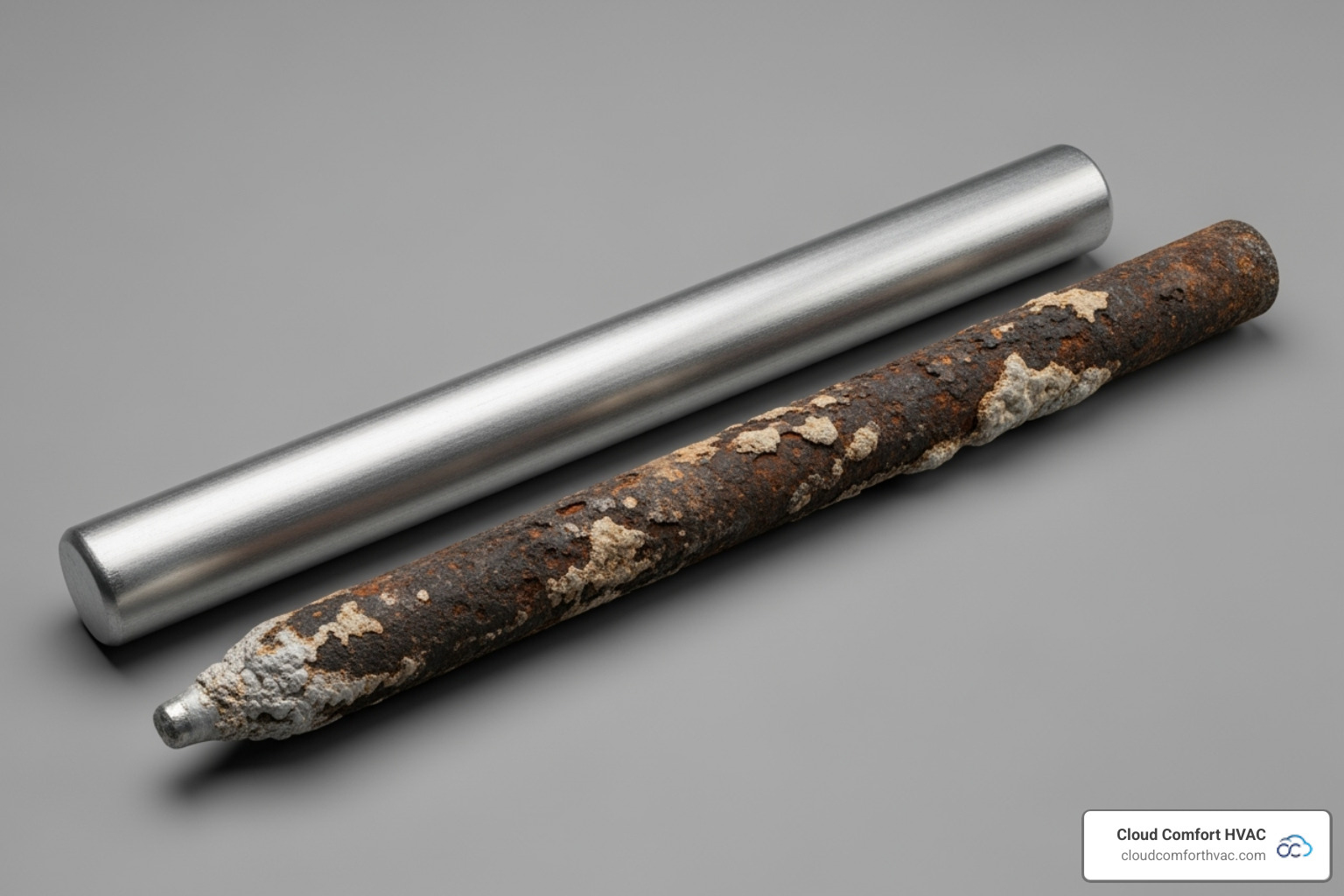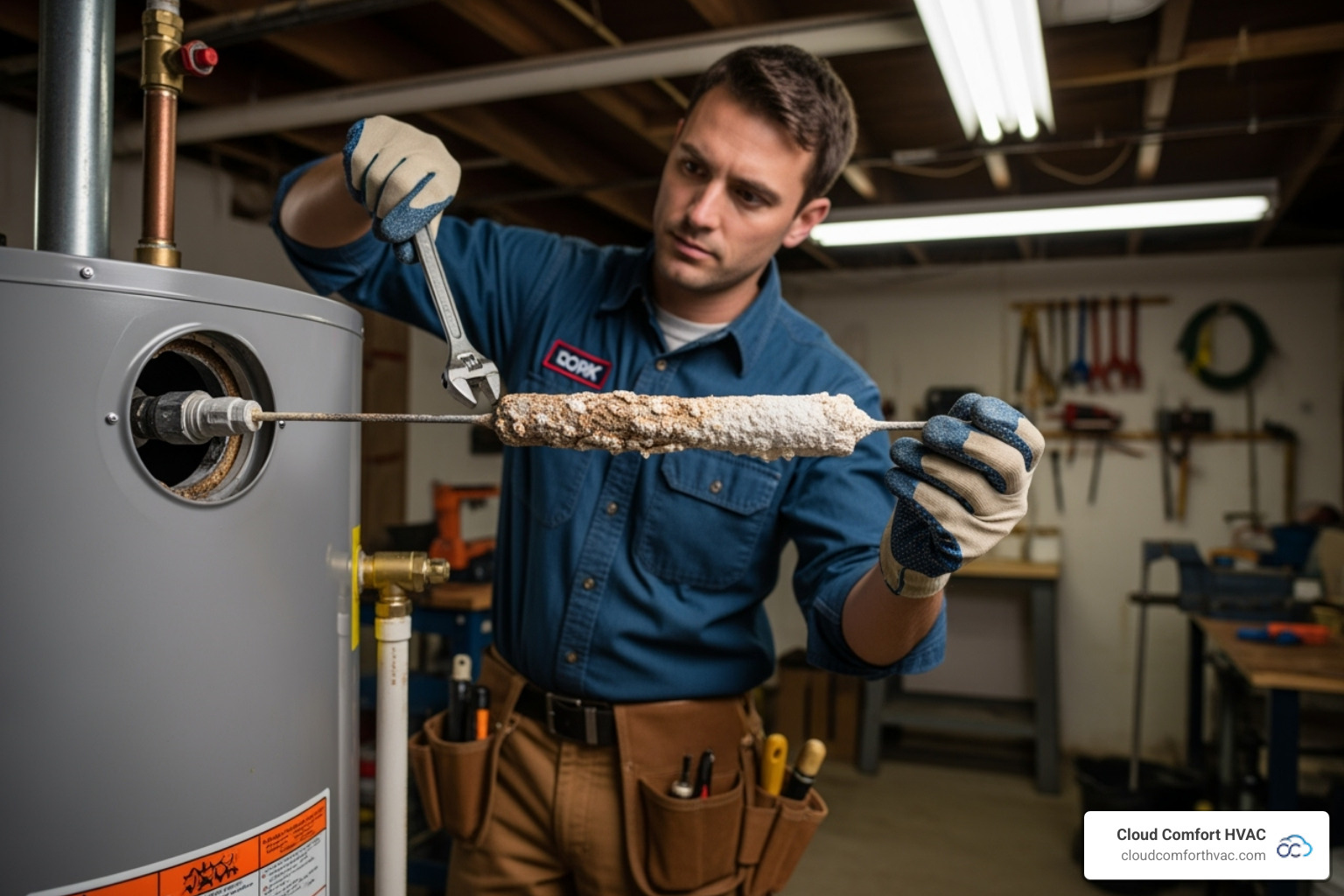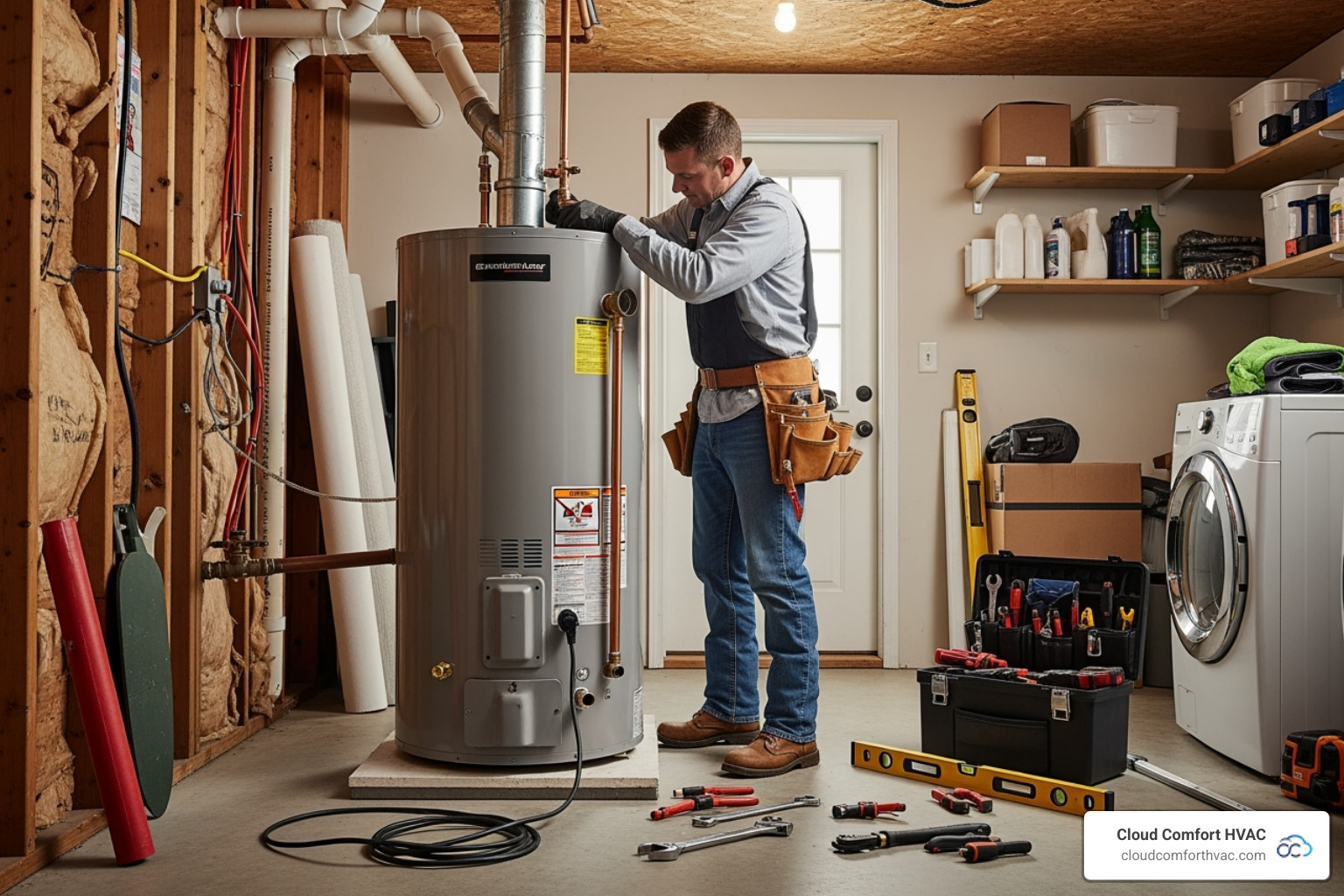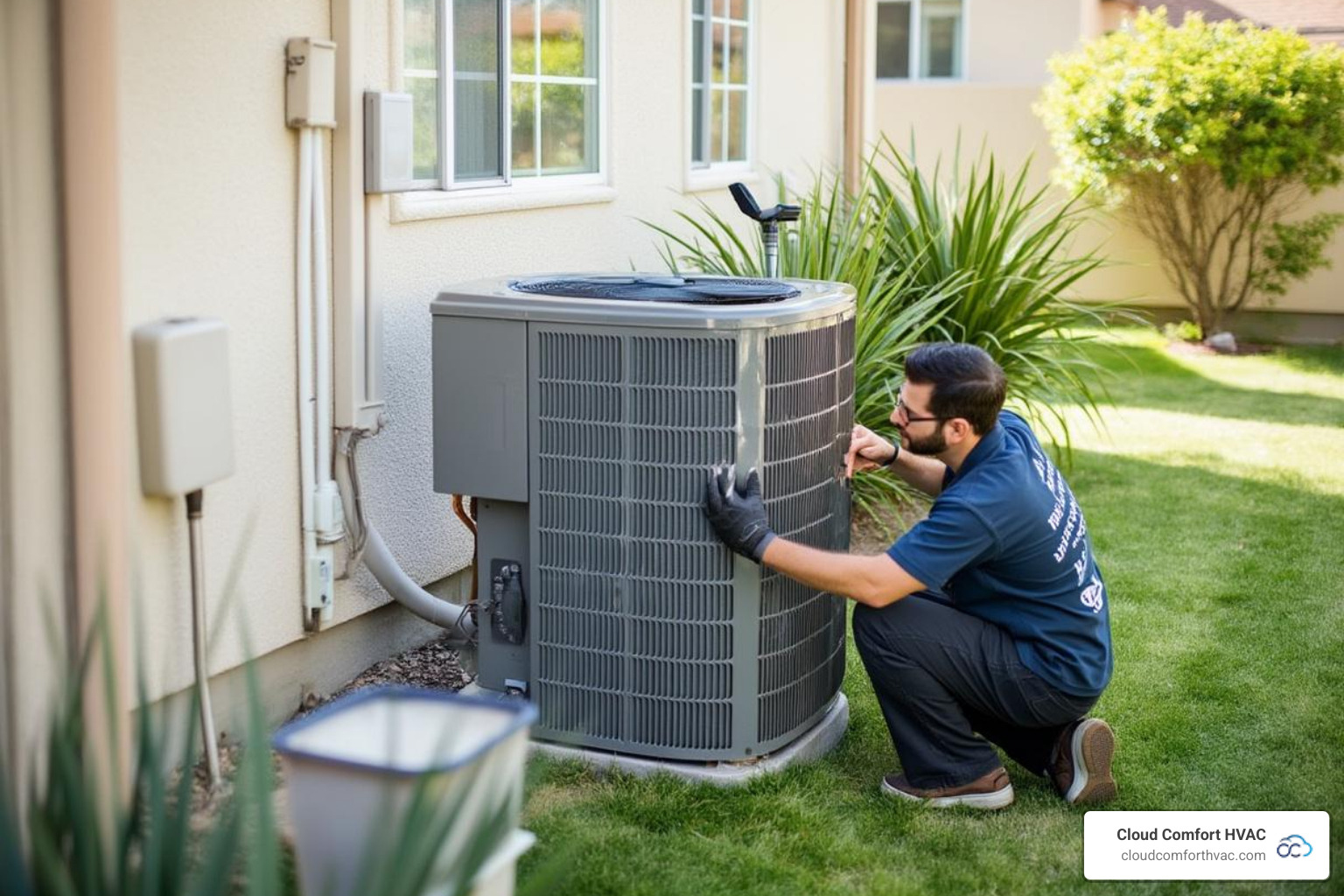From Gas Lines to Earthquake Straps: Understanding Your Water Heater's Vital Parts
Your Water Heater's Unseen Protector
When it comes to keeping your water heater healthy and lasting longer, the water heater anode rod is an essential part you need to know about. It's often called the "sacrificial anode" because of the important job it does inside your tank.
Here’s the quick truth about your water heater anode rod:
- It's a metal rod, usually made of magnesium, aluminum, or zinc.
- It sits inside your water heater tank.
- Its main job is to stop your tank from rusting and corroding.
- It does this by corroding itself instead of the tank. Think of it as a bodyguard for your water heater, taking the hit so the tank doesn't.
You see, your water heater tank is made of steel. Steel can rust when it's constantly in contact with water. To prevent this, manufacturers add a special coating, but that's not enough on its own. That's where the anode rod steps in. It uses a clever trick of chemistry to protect the tank from corrosion.
Without this little hero, your water heater would start rusting from the inside out much faster. This leads to leaks, inefficiency, and ultimately, big repair bills or the need for a whole new water heater.
This small but mighty component is one of the unsung heroes of your home's hot water system. Knowing how it works and why it matters can save you a lot of headaches and money down the road.

The Sacrificial Guardian: How a Water Heater Anode Rod Works
At Cloud Comfort HVAC, we often explain that the water heater anode rod is like your tank's personal bodyguard against rust. Its main job, or primary function, is incredibly important: it stops your water heater's steel lining from corroding. Think of it as a quiet hero, always on duty. Without this little protector, your water heater's life would be cut dramatically short, leading to early leaks and expensive replacements.
So, how does this unsung hero perform its magic? It all comes down to a clever chemical process called galvanic corrosion. Imagine your water heater tank, which is made of steel. Inside, you have the anode rod, typically crafted from a more active metal like magnesium, aluminum, or zinc. When these two different metals are sitting in water—which acts like a conductor, or electrolyte—a tiny electrical current starts to flow.
This current causes the more active metal (that's your anode rod!) to corrode first, instead of the less active steel tank. The anode rod literally "sacrifices" itself. It attracts and neutralizes the elements in the water that would otherwise attack your tank. This is why it's so fittingly called a "sacrificial anode." It bravely dissolves over time, leaving your steel tank safe and sound.

This continuous process of self-sacrifice is key to extending the lifespan of your water heater. In fact, keeping your water heater anode rod replaced on time could potentially double the lifespan of your hot water heater! It's a small investment in maintenance that offers massive returns by preventing tank failure and keeping your hot water flowing. We've seen how a well-maintained anode rod keeps water heaters running efficiently for years in homes throughout our service areas, from Rancho Palos Verdes to Torrance, CA.
The science behind anode rods is truly remarkable and crucial for understanding why this component is so vital for your water heater's health. For more detailed insights into how these systems protect your investment, you can explore resources like those from the U.S. Department of Energy.
Our comprehensive Water Heater Services include thorough inspections of your anode rod. We make sure it's doing its job effectively, helping us prevent major issues before they ever become a headache for you.
Choosing Your Champion: Types of Anode Rods Explained
When it comes to selecting the right water heater anode rod for your home, think of it like choosing a bodyguard for your water heater. You want someone who's tough, reliable, and perfectly suited for the specific challenges they'll face. The good news? You have several excellent options to choose from.
Let's start with the traditional heroes: sacrificial anode rods. These are the classic workhorses that literally give their lives to protect your tank. They come in three main varieties, each with their own personality and strengths.
Magnesium anode rods are like the overachievers of the anode world. They're incredibly reactive, which means they provide excellent protection, especially if you have soft water. However, their enthusiasm for the job means they get consumed faster than other types. There's one quirk you should know about: magnesium can sometimes react with certain water chemistries to create that unmistakable rotten egg smell. If your hot water occasionally smells like sulfur, your magnesium rod might be the culprit.
Aluminum anode rods take a more measured approach. They're the practical choice that offers solid protection while lasting longer than their magnesium cousins. They work particularly well in hard water conditions and are generally more budget-friendly. The trade-off? They can sometimes produce a gel-like substance as they corrode, though this rarely causes problems in most homes.
Here's where things get interesting: zinc-aluminum anode rods. These clever combinations take regular aluminum and add a small amount of zinc to create a specialized solution for one very specific problem. If you've ever turned on your hot water tap and been hit with that awful rotten egg smell, zinc-aluminum rods are often the perfect fix. The zinc works to suppress the bacteria that create hydrogen sulfide gas, eliminating the odor while still protecting your tank.
Now, let's talk about the modern marvel: powered anode rods. These aren't your grandfather's anode rods. Instead of slowly dissolving away, powered rods use a small electrical current to create a protective field inside your tank. Made from durable materials like titanium, they plug into a standard electrical outlet and work continuously to prevent corrosion.
The beauty of powered rods lies in their longevity and effectiveness. While sacrificial rods need replacement every few years, a quality powered rod can protect your water heater for decades. They're particularly brilliant at eliminating odors – often within hours of installation. Plus, they're not affected by water softeners, which can actually make softened water more aggressive toward traditional sacrificial anodes.
| Anode Rod Type | Pros | Cons | Best Use Cases |
|---|---|---|---|
| Magnesium | Excellent protection; Perfect for soft water | Faster consumption; May contribute to sulfur smell | Soft water areas; Maximum protection needed |
| Aluminum | Longer lasting; Cost-effective; Great for hard water | Can create gel byproduct; Less reactive than magnesium | Hard water conditions; Budget-conscious homeowners |
| Zinc-Aluminum | Eliminates rotten egg smell; Good protection | Still needs replacement every few years | Homes with sulfur odor issues |
| Powered | Lasts decades; Eliminates odors; Maintenance-free | Higher upfront cost; Needs electricity | Long-term solution; Persistent odor problems; Homes with water softeners |
The relationship between water softeners and anode rods deserves special attention. While soft water feels great on your skin and prevents scale buildup, it can actually be more aggressive toward metals. The sodium ions in softened water make it more conductive, which can speed up the consumption of sacrificial anodes. If you have a water softener system, a powered anode rod might be your best long-term investment.
At Cloud Comfort HVAC, we help homeowners throughout our service area choose the right anode rod for their specific water conditions and needs. Whether you're dealing with hard water vs soft water challenges or trying to eliminate that pesky sulfur smell, we can guide you to the perfect solution.
For more insights about protecting your investment, check out our comprehensive information about Gas Water Heaters in Torrance, CA, where proper anode rod selection plays a crucial role in system longevity.
Maintenance and Replacement: A Homeowner's Guide to the Water Heater Anode Rod
Just like getting regular oil changes for your car, proactive maintenance for your water heater is crucial for its longevity and efficiency. The water heater anode rod is a prime example of a component that requires attention. Regular inspection and timely replacement can prevent minor issues from escalating into major, costly problems.

We understand that maintaining your water heater might not be at the top of your mind, but trust us, it's worth it. Ignoring the anode rod can lead to premature tank corrosion, reduced hot water output, and even tank leaks. Let's dig into how you can keep an eye on this vital part.
Signs Your Anode Rod Needs Attention
Your water heater often gives subtle hints when its anode rod is nearing the end of its sacrificial life. Learning to recognize these red flags can save you from a cold shower and a hefty repair bill.
- Rusty or Discolored Water: This is one of the most common and alarming signs. If you notice your hot water coming out with a reddish-brown tint, it's a strong indicator that your anode rod is severely depleted, and your tank is beginning to rust. The anode rod is no longer able to protect the tank, and the steel walls are starting to corro corrode. If you're seeing brownish water coming from your taps, it's time to act.
- Sulfur or "Rotten Egg" Smell: This particularly unpleasant odor, often described as a "rotten egg" smell, is a tell-tale sign of bacterial activity in your water heater. Certain harmless bacteria react with the magnesium or aluminum in the anode rod, especially in water with high sulfate content, to produce hydrogen sulfide gas. If your hot water smells like a science experiment gone wrong, your anode rod is likely involved.
- Unusual Noises (Popping, Rumbling): While these noises can sometimes indicate sediment buildup, they can also be related to an aging anode rod. A heavily corroded anode rod can break down and contribute to sediment at the bottom of the tank, leading to rumbling or popping sounds as the heating elements try to heat water through the sediment layer. This reduces efficiency and puts strain on the tank.
- Reduced Hot Water Output: Though less direct, a severely corroded anode rod can sometimes be associated with a decline in hot water performance. As the tank corrodes, its efficiency can drop, and sediment buildup can further reduce the effective volume of hot water.
- Physical Inspection: The most definitive way to tell if your anode rod needs attention is a physical inspection. A healthy anode rod will have some minor pitting and wear. However, if it’s heavily corroded, reduced significantly in size (e.g., less than ½ inch thick), or covered in a thick layer of calcium, it needs to be replaced.
Inspection and Replacement Schedule for your water heater anode rod
Regular inspection is key to extending the life of your water heater. We recommend getting your water heater anode rod inspected at least once a year. This check is crucial for catching problems early, especially if you have a water softener or naturally hard water, as these conditions can accelerate anode rod consumption. For example, in areas like Palos Verdes Estates with varying water chemistries, annual checks are particularly beneficial.
Based on our experience and industry recommendations, here's a general guideline for anode rod maintenance:
- Inspection Frequency: Most water heater manufacturers and plumbing experts suggest inspecting the anode rod every 1 to 3 years. For homes with water softeners or known hard water, we often advise checking it annually, as these conditions can significantly speed up the rod's deterioration.
- Replacement Frequency: Anode rods typically last about 3-5 years, but this can vary widely. Factors influencing the lifespan include:
- Water Hardness: Hard water contains more minerals that can react with the anode rod, causing it to deplete faster.
- Water Usage: Higher hot water usage means more water flowing through the tank, leading to more interaction with the anode rod and faster consumption.
- Water Softener Impact: As we mentioned, softened water can be more aggressive, accelerating anode rod wear.
- Water Heater Type: Different water heater designs and tank sizes can also influence anode rod lifespan.
The goal is to replace the anode rod before it's completely consumed. If it's heavily corroded, reduced significantly in size, or covered in a thick layer of calcium, it's time for a new one. We emphasize this during our Water Heater Repair in Manhattan Beach, CA services, ensuring your system is always optimally protected.
DIY vs. Professional Replacement of a water heater anode rod
For the ambitious homeowner, replacing a water heater anode rod might seem like a manageable DIY project. And while it is technically possible, we want to ensure you're aware of the potential risks and complexities involved.
DIY Risks and Considerations:
- Warranty Concerns: This is a big one! In some cases, attempting to replace your water heater’s anode rod yourself could inadvertently void the appliance’s warranty. Always check your manufacturer's warranty terms before undertaking this operation.
- Required Tools: You'll need specific tools, most notably a large socket wrench (often a 1 1/16-inch socket) and a breaker bar to handle the often tightly-torqued rod.
- Stuck Rods: Anode rods can become incredibly seized and difficult to remove due to corrosion and mineral buildup. We've seen homeowners struggle with stubborn rods that seem impossible to budge. Applying WD-40 or even using an impact wrench might be necessary, but this adds to the complexity.
- Potential Leaks: Improper reinstallation can lead to leaks around the anode rod port, which can cause water damage and further headaches.
- Safety: Working with water heaters involves electricity (or gas) and hot water. Shutting off power and water supply, and draining the tank, are critical safety steps that must be followed precisely.
- Space Constraints: Many water heaters are installed in tight spaces, making it difficult to maneuver a long anode rod out and a new one in. Flexible anode rods exist for these situations, but they still require careful handling.
While there are many excellent online guides for DIY replacement, we often recommend professional assistance for this task. Why? Because a professional can:
- Ensure Safety: We have the expertise and proper equipment to safely disconnect power, drain the tank, and handle the heavy rod without risk of injury or damage.
- Prevent Warranty Issues: Our technicians are familiar with warranty requirements and can perform the replacement without voiding your coverage.
- Handle Stubborn Rods: We have specialized tools and techniques for removing even the most seized anode rods.
- Proper Installation: We ensure the new rod is installed correctly, preventing leaks and guaranteeing optimal protection for your tank.
- Comprehensive Inspection: While replacing the anode rod, we can also perform a quick check of other components, catching any other potential issues.
- Expert Advice: We can advise on the best type of anode rod for your specific water conditions and usage, ensuring maximum longevity for your water heater.
If your water heater is over 15 years old, we might even suggest that a full replacement is more advisable than just replacing the anode rod, as the tank itself might be nearing the end of its life due to overall corrosion. For reliable and safe Water Heater Installation in Carson, CA, or any of our service areas, our team is ready to assist.
Frequently Asked Questions about Anode Rods
Here at Cloud Comfort HVAC, we often chat with our wonderful customers from Culver City, Torrance, and Palos Verdes Estates about their water heaters. It's only natural to have questions about something so vital to your daily comfort! One component that sparks a lot of curiosity is the water heater anode rod. Let’s dive into some of the most common questions we hear.
What happens if you don't replace a depleted anode rod?
Imagine your water heater tank as a fortress. The water heater anode rod is its brave, self-sacrificing knight, standing guard against corrosion. If you neglect to replace this knight when it's depleted, you're essentially leaving your fortress undefended. The consequences can be quite serious and definitely not something you want to deal with.
Without that sacrificial anode to protect it, your steel water heater tank becomes the next target for corrosion. It will start to rust from the inside out. You might first notice rust buildup in your hot water, leading to discolored, brownish water coming from your taps. Nobody wants a rusty shower!
Eventually, this relentless corrosion will eat through the tank's steel walls, leading to premature leaks. Once your water heater tank springs a leak, it's typically beyond repair. This means what could have been a relatively simple and affordable anode rod replacement turns into a full-blown water heater failure, requiring a much larger and more involved investment in a brand new unit. Truly, the anode rod is your tank's bodyguard, and letting it fall means the tank is next in line for trouble.
Does replacing an anode rod void my water heater's warranty?
This is a really smart question, and it's something many homeowners worry about! Thankfully, the good news is that generally, replacing your water heater anode rod does NOT void your water heater's warranty. This is as long as the replacement is done correctly and follows the guidelines set by the manufacturer.
Think of it this way: manufacturers usually consider the anode rod a "maintenance part." Just like changing the oil in your car is essential routine maintenance, replacing the anode rod helps ensure your water heater continues to function properly and lasts as long as it's designed to. It’s about taking good care of your appliance.
In the United States, your rights are often protected by something called the Magnuson-Moss Warranty Act. This law generally prevents manufacturers from voiding a warranty just because you used an aftermarket part or did some DIY maintenance, unless they can clearly prove that the specific part or your maintenance caused the problem. It’s all about consumer protection!
However, it's always a good idea to check your specific water heater's warranty documents or chat with a certified professional. While replacing the anode rod itself won't void the warranty, improper handling during the process – like accidentally damaging other parts or causing a leak – could potentially lead to issues with a warranty claim. That's why attention to detail is so important. At Cloud Comfort HVAC, we always perform maintenance to the highest industry standards, giving you peace of mind.
What is the typical cost of replacing an anode rod?
The cost of replacing a water heater anode rod is a common question, and it really depends on a couple of factors: whether you decide to tackle it yourself or hire a professional, and which type of rod you choose.
If you're considering the anode rod itself, standard sacrificial rods (like aluminum, magnesium, or zinc-aluminum) are generally quite affordable. Powered anode rods, which offer a more modern and long-lasting solution, represent a larger upfront investment due to their advanced technology. However, many homeowners find their extended lifespan and odor-fighting benefits make them well worth it in the long run.
If you choose to have a professional handle the job, you'll also factor in professional labor costs. This can vary depending on where you live and how complex the job is – for example, if the old rod is particularly stubborn and hard to remove.
Whether you're replacing a standard rod or upgrading to a powered one, the total investment for a professional replacement is significantly less than the cost of having to replace an entire water heater. Think of it as a small, smart investment that protects a much larger one. It helps keep your hot water flowing reliably and your water heater happy for years to come.
Conclusion: Protecting Your Investment for Years to Come
Your water heater anode rod might be small and hidden from sight, but as we've finded together, it's truly the unsung hero of your home's hot water system. This little sacrificial guardian works around the clock, using the fascinating science of galvanic corrosion to protect your steel tank from rust and premature failure.
Think about it this way: for the cost of a nice dinner out, you can replace an anode rod and potentially double your water heater's lifespan. That's pretty amazing when you consider the alternative—a cold shower and a hefty bill for a brand-new water heater.
We've walked through the different champions you can choose from, whether it's the reliable magnesium rods for soft water, the versatile aluminum options for hard water conditions, zinc-aluminum rods to combat that dreaded rotten egg smell, or the high-tech powered rods that can last for decades. Each has its place, and the right choice depends on your unique water conditions and household needs.
The key takeaway? Proactive care is everything. Watching for those telltale signs like rusty water or strange smells, sticking to regular inspections every 1-3 years, and replacing your anode rod every 3-5 years can save you from major headaches down the road. While some homeowners tackle this as a DIY project, we've seen how professional service ensures safety, proper installation, and protects your warranty.
At Cloud Comfort HVAC, we believe your home should be your sanctuary—a place where hot showers are guaranteed and surprises are limited to birthday parties, not plumbing emergencies. Whether you're in Rancho Palos Verdes dealing with unique water conditions, or anywhere across Manhattan Beach, Culver City, Torrance, Palos Verdes Estates, or Carson, CA, we're here to keep your comfort systems running smoothly.
Our commitment to transparent pricing, energy-efficient solutions, and reliable service means you'll never be left guessing about costs or wondering if the job was done right. We take pride in our high Google ratings and back our work with strong warranties because we know that peace of mind is just as important as hot water.
Don't wait until you're dealing with rusty water or a leaking tank. Your water heater anode rod deserves attention now, while it can still do its job effectively. A little maintenance today prevents a lot of trouble tomorrow.
Ready to give your water heater the care it deserves? Schedule your water heater replacement in Torrance, CA today! Our expert team is standing by to help you enjoy worry-free hot water for years to come.

.avif)
Customer Testimonials
Hundreds of 5-Star Reviews on Google Show Our Commitment to Customer Satisfaction




New Air Conditoining Unit for as low as $79/mo + Free Wi-Fi Thermostat
(Or As Low As $4,995 as a One-Time Payment)
FINANCE WITH $0 PAYMENTS & 0% INTEREST FOR 12 MONTHS, OAC
Hurry! Offer Ends Soon.






